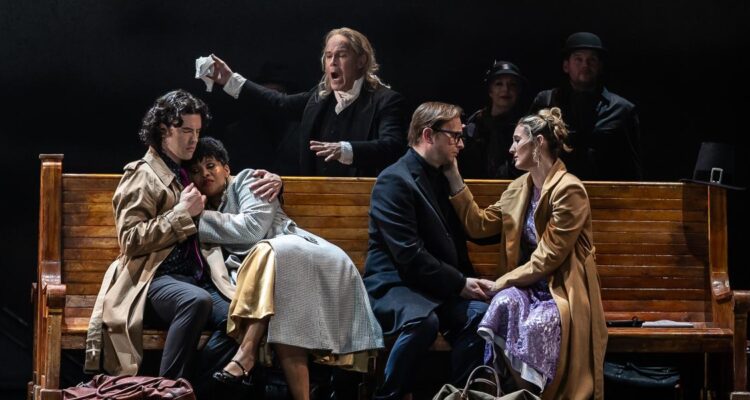There have been many takes on Mozart’s masterpiece. This, the third revival of Gloger’s production is a dud, with some interesting ideas.
During the overture, the action starts at the end – the curtain calls in front of the ROH famous red curtains as the ‘cast’ of Cosi take their bows. Fiordiligi, Dorabella, Guglielmo and Ferrando applaud from a box at the side of the stage. They walk onto stage brandishing ROH programmes, congratulating their friend who has sung Don Alfonso (Gerald Finley). Alfonso never comes out of costume the whole way through(why?), whereas the others are in modern dress. Fiordiligi and Dorabella retreat to the ROH Crush Room post-performance discussing their boyfriends, hoping that tonight they will finally propose. Alfonso plots with the boyfriends to play a cruel trick showing they will be unfaithful as all women are – così van tutte. The boys miss the train taking the ‘soldiers’ away as the girls cling to them(why?). Thinly disguised, they reappear to seduce the opposite female. They ‘poison’ themselves in a fake Garden of Eden with serpent. How can the girls, knowing their guys so well, not see through the pathetic disguise? Maybe they ‘fall’ for the opposite guys because they actually ‘propose’ at last? Despina is a glamorous barmaid behind the Paul Hamlyn bar.
We think cancelling someone is ultra-modern. Mozart got there first! Ferrando furiously sings, believing Fiordiligi’s betrayal – ‘vuol cancellarla’ – I shall cancel her!
The trick the boys play on the girls is humiliating. Here, the girls discover the con at the beginning of Act 2 – they find discarded clothes, fake moustaches and other clothes in a costume box backstage. This happens so quickly; nothing is done to develop the idea. So much could have been done – Fiordiligi’s second aria could have been intentionally overheard. There are so many wasted opportunities, The set is a mess, backstage, front stage, dressing rooms, prop boxes with Despina’s ‘disguises’, bits of theatre, distracting people running everywhere.
In Act 2, Così Fan Tutte is emblazoned in neon lights. While Mozart’s title, Tutte, means “all women,” the switch to Tutti, meaning “everybody,” broadens the critique to include the audience, though few notice the Italian wordplay.
The cast do their best to salvage Mozart’s sublime music. They are well matched. None have large voices, including, surprisingly, veteran Canadian baritone Gerald Finley, inhabiting Alfonso well. His voice suits the music; his Italian is excellent.
A mezzo is usually cast as Dorabella. Mozart did not write it for a mezzo; mezzos did not then exist. They were second sopranos. Dorabella lies high for mezzos, particularly ‘Amore é un ladroncello’, because it goes constantly in and out of the ‘passaggio’ (the ‘passageway’ between middle and head voice). It is often cut as mezzos cannot sing it. American mezzo, Samantha Hankey, in her ROH debut as Dorabella makes the aria sound easy. She is the standout singer of the show.
South African soprano Golda Schulz as Fiordiligi, has a disappointingly small voice. She clips the Italian vowels short hitting the consonants too hard, jolting the vocal line. She lacks power in the lower register, particularly noticeable in ‘come scoglio’. It is a myth that ‘come scoglio’, is tough. It is an extended vocalise spanning just over two octaves. It is arpeggios. Singers warm up on arpeggios. Mezzos can sing it. Sustained singing such as ‘Dove sono’ (Figaro) is much harder.
Italian baritone André Schuen as Guglielmo has a warm voice that suits Mozart well, and his character’s swagger crumbles effectively in Act 2. German tenor Daniele Behle returns as nerdy Ferrando, acting stiffly but singing with delicate subtlety. British soprano Jennifer France is a perfect Despina, adept with all the comic voices for the ‘doctor’ and the ‘lawyer.’
Those seeing this for the first time, will not get it. I overheard someone saying – ‘I shall never see this one again’. This rendition fails to capture Mozart’s essence; it needs rethinking. For a comic opera, it is not funny.
Royal Opera House, Covent Garden
Opera Buffa in Two Acts
Music by Wolfgang Amadeus Mozart
Libretto by Lorenzo da Ponte
Conducted by Alexander Soddy
Directed by Jan Philipp Gloger
First performance Burgtheater Vienna, 26th January 1790
Cast includes Daniele Behle, André Schuen, Gerald Finley, Golda Schultz, Samantha Hankey, Jennifer France.
Running time 3 hours 15 minutes with one interval
Performances until 10th July 2024
Photographed by Clive Barda

